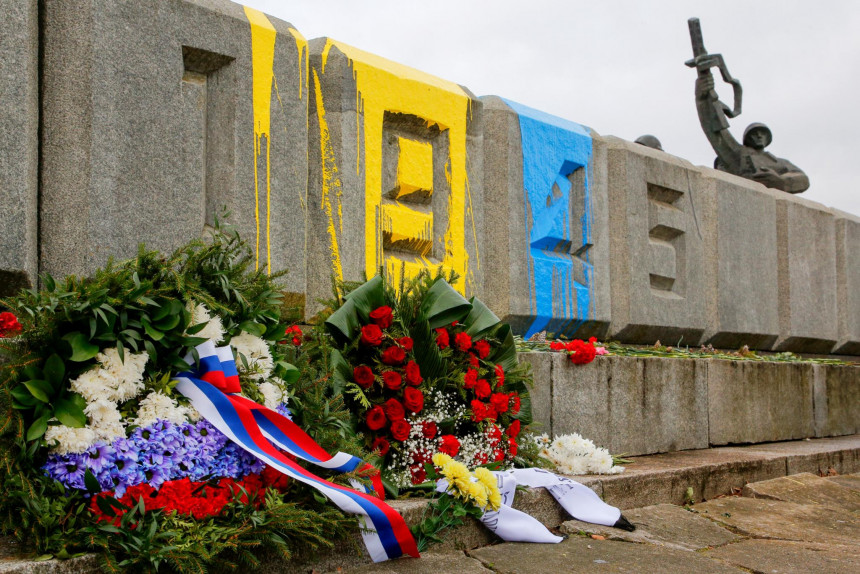Pro-Kremlin activists gather to guard Soviet monuments

The police would not need to spend significant resources on guarding monuments glorifying Soviet power and the Red Army, as this is already being done by pro-Kremlin individuals organized by the Latvian Russian Union (Latvijas Krievu savienība) and Jeļena Osipova and Jevgēņijs Osipovs – people who are well-known to the State Security Service. They call their activities the night watch.
On February 24, the day Russia invaded Ukraine again, the State Police issued a special order to include World War II monuments, cemeteries and memorials in their patrol routes. The police had information that "certain individuals are planning to carry out protest activities of a criminal nature, aimed, for example, at damaging property". The police authorities were particularly concerned about the possible negative repercussions in the media. Neatkarīgā reported more about this in the publication "Police have been tasked with guarding Soviet monuments".
The prediction that public anger at Russia's criminal actions would be directed against the artefacts of communist ideology turned out to be entirely correct. Already in several places in Latvia, monuments to the Red Army have been splattered with the colors of the Ukrainian flag. This constitutes "damage to property" in the police's understanding. More than 30 years after the restoration of independence, Latvia is full of all kinds of objects glorifying the Soviet occupation power, which in the context of the Ukrainian war seem unacceptable to many citizens. Basically the same army that once occupied Latvia is now occupying Ukraine and killing Ukrainians.
Sickles, hammers and other Kremlin tools
On February 25, this stain of shame was applied to the largest and most powerful symbol of Soviet power in Latvia - the "Monument to Soviet Soldiers - Liberators of Soviet Latvia and Riga from German Fascist Invaders". The monument was splattered with yellow and blue paint in a relatively small square, alongside the words "Glory to Ukraine!". A few hours later, a man came with a hammer and, expressing his civic stance, smashed a small dent in the obelisk. This action provoked a widespread reaction among supporters of the Kremlin's policy. At a time when the need and public demand to dismantle the "Monument to the Soviet Soldiers - Liberators of Soviet Latvia and Riga from the German Fascist Invaders" is being discussed at the government level, the political party Latvian Russian Union has announced funds to restore this object glorifying the Soviet occupation. Volunteer guards are being organized for Soviet monuments throughout Latvia. Supporters from Liepāja are mobilized by Kremlin agents Jeļena Osipova and Jevgēņijs Osipovs. On social media, the profiles of the monument guards include sickles, hammers, Russian flags, Red Army stars, St. George's ribbons and other attributes that show loyalty to the Kremlin, while derogatory texts show hatred towards Latvians and Ukrainians.
Police and the Osipov couple on night watch
The Latvian Russian Union has issued a public call to join the guard of Soviet monuments. It thanks law enforcement officers for their work, but also explains that it is impossible to control the situation at all monuments in the country without the support of volunteers. That is why the "Night Watch" campaign is being implemented.
After the night watch in Liepāja, the Osipov couple also praised the police for reacting to the presence of the activists and for being even more active, scaring away potential vandals with their appearance and dozens of crews.
The monuments glorifying the Latvian occupation are therefore safe. Meanwhile, the Foreign Ministry of the Russian Federation has warned the Baltic States of an "anti-Russian psychosis". This diagnosis has been made in embassies surrounded by peaceful anti-war protests, including in Latvia. It is, however, quite difficult to read the original statement, as the embassy's website is suffering from systematic and chronic difficulties. There are also people in virtual space who want to express their civic position on Russia's criminal invasion of Ukraine.